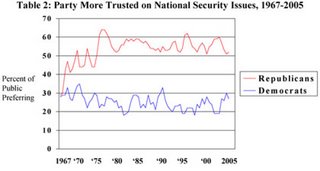
Lieberman’s defeat is seen as setback for the centrist Democratic Leadership Council, the American third wayers. Their material is often insightful but sometimes prone to mixing up perceptions and fact. An interesting paper from the Truman Project on why the Democrats are less favoured on national security than the Republicans (from which comes graph) is however full of arguments like:
Carter's initial missteps poisoned public perception of his fitness to handle America's security, particularly in the midst of a crisis abroad. After initially rallying around the President in the wake of the Iranian hostage crisis, the public quickly grew impatient with his inability to bring the hostages home safely. When a daring rescue attempt ended in failure, public mistrust of Carter only grew. Similarly, the Soviet invasion of Afghanistan was blamed on Carter's conciliatory stance toward the Soviet Union. By the end of his four years in office, the American public "felt bullied by OPEC, humiliated by the Ayatollah Khomeini, tricked by Castro, out-traded by Japan and out-gunned by the Russians." The narrative of Democratic incompetence spoiled Carter's foreign policy successes, most notably the Camp David Accords. To be sure, Carter was wise to recognize the security relevance of "soft" foreign policy tools such as human rights promotion (the Bush Administration has lately come around to this view itself). But whatever the wisdom of Carter's policies, their political symbolism was disastrous, feeding into the perception that Democrats shy away from projecting American power and leave our security vulnerable. Because Carter's policies were seen as weak, his symbols began to seem weak as well. Concepts like peace, cooperation, and human rights came under Carter to imply weakness. Together, these fueled a negative narrative. Without intending it, Jimmy Carter drove home the notion that Democrats were skeptical of American strength, determined to scale back the military, and too timid to stand up to our enemies' acts of aggression.
Will Marshall of the Progressive Policy Institute is similar:
There is no doubt that the Iraqi insurgency has been a catalyst for the growth of the global jihad. But that doesn't mean the jihadist fever will subside if the United States suddenly leaves Iraq. On the contrary, driving the American Goliath out of Iraq would burnish the jihadist mystique and convince many fence-sitters to sign up.
So the criteria for foreign policy is what our enemies think? I’ll take wisdom over symbolism any day. That being said there are some good points in the Truman Project paper on how to mobilise public opinion.


1 Comments:
Excellent, love it! Dance dance revoultion Lesbian tit bondage
Post a Comment
<< Home